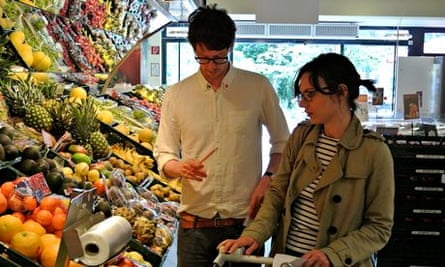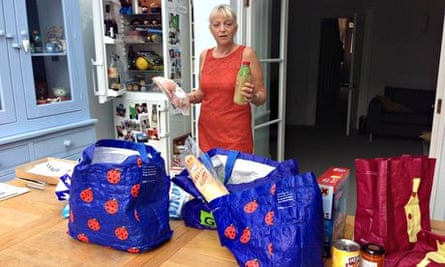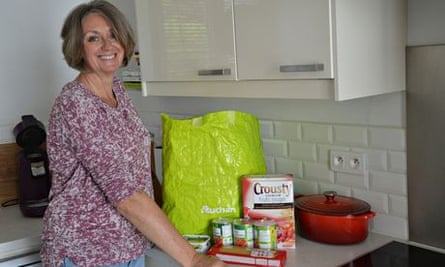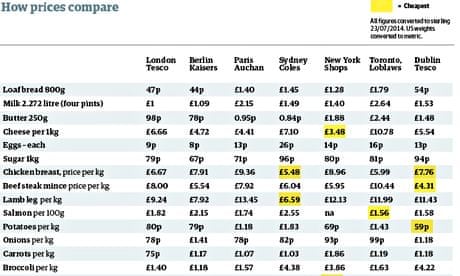Germans pay the least for their groceries and Canadians the most, according to a survey of supermarkets in seven major world cities by Guardian Money, which found that British shoppers generally enjoy low prices compared with families overseas.
The survey also confirmed some national stereotypes. Beer was cheapest in Germany, while New Yorkers have the lowest prices for Coca-Cola. Potatoes are a bargain, guess where, in Ireland. And Britain? We have the cheapest bananas.
Europeans generally fared better than North Americans or Australians. The vast prairies of the US make it the bread basket of the world, yet shoppers in New York pay twice the price for a loaf of bread than those in London or Berlin. In Toronto, sky-high prices for meat pushed a typical trolley of goods to the highest in the survey.
We don't claim our survey is an exhaustive or scientific analysis of grocery prices around the world. We asked our correspondents and contributors in the seven cities to go to their usual supermarket – which may not necessarily be the cheapest. Kaiser's in Berlin is pricier than Lidl. Auchan may not have had the same offers as Carrefour in Paris.
We created the shopping list in London, and it inevitably reflects British purchasing habits. Fresh milk appears madly expensive in Paris – more than double the price charged in London – but the French buy relatively little fresh milk, preferring UHT instead.
We tried to match items as closely as possible, yet local variations make comparisons difficult. Some chains offer ultra-cheap "basics" items, such as Tesco's "everyday value" sliced white bread, which at 47p a loaf is one third the price of Kingsmill wholemeal bread.
Parisians might turn up their noses at such low-cost items – in Auchan, loaves started at around £1.40, but they are probably a very different product to English sliced white. And how should we account for local tastes? In London, our shopper bought cheddar, in Paris it was camembert and in Berlin, gouda. We didn't even try to compare with Shanghai or Tokyo, where dairy products remain a very infrequent purchase.
New York presented the biggest challenge. Our shopper used a mix of local stores – reflecting the fact that while Londoners might see a Tesco on every major shopping street, New Yorkers do not have a Walmart on their doorsteps. Interestingly, our New York and Toronto shoppers specified that they had bought "free from hormones" meat; in the EU, beef with injected hormones is banned.
Finally, fluctuating exchange rates make price comparisons treacherous. Both the Australian and Canadian dollars rapidly appreciated against sterling, and although the pound has recovered some ground this year, it is still a long way below its peak – making prices in those countries appear very high, although compared with local wages they are much less so.
However, the examples below do represent the experience of local people in real supermarkets, and give a flavour of who is, and who isn't (that's you, Canada) getting a good deal.
Berlin
Cheapest for bread, butter, eggs, sugar, apples, olive oil, beer, toilet paper
Pricey for almost nothing

The Guardian's Berlin correspondent Philip Oltermann and his partner (above) went shopping at Kaiser's, a pricier and more upmarket chain than fellow German giants such as Lidl or Aldi – yet he was still charged significantly less than at any other supermarket we surveyed around the world.
Most German supermarkets have copied the discounters, offering cheap prices on milk and meat, and as in Britain, there has been a significant shift from branded to own-brand goods.
"Whereas both Lidl and Aldi are enjoying runaway success abroad, their situation has been less comfortable in Germany," says Oltermann. "If anything, the past few years have seen a trend of shoppers moving away from discounters towards premium supermarkets like Edeka and Rewe, many of whom have copied their cheaper rivals' success and offer own-brand goods. According to Germany's biggest market research institute, GfK, the percentage of branded goods across German supermarkets has sunk by 9% since 2008."
Meanwhile, German shopping habits are evolving fast. According to a GfK survey from October last year the number of people who say they deliberately buy less so they don't have to throw away has risen from 44% to 52% since 2010.
"Demographic change plays a crucial role in this trend. In Germany, the number of large households who do their weekly shop in one go is shrinking. Young, single-household shoppers tend to shop more spontaneously, and are more likely to ignore supermarkets altogether in favour of eating out, or do their shopping at local markets."
London
Cheapest for milk, bananas, baked beans, cornflakes, carrots
Pricey for mince, wine, cheese, Coca-Cola

London may be viewed internationally as a very expensive city, but in our survey it was second cheapest for groceries. Some things appear crazily cheap – for example, bananas in Tesco are half the price of those at Auchan in Paris and a quarter of those in Loblaws in Toronto. Milk is also a fraction of the price charged in other international cities, and eggs too. But these super-low prices have attracted controversy. When Tesco slashed the price of a four-pint 2.27 litre carton from £1.39 to £1 earlier this year, it prompted howls of outrage from dairy farmers. The Fairtrade Foundation says the price war over bananas is seriously damaging developing countries.
But British shoppers fare poorly in some areas. Duties make wine prices high while, oddly, Tesco sells Coca-Cola at almost three times the price we found in New York. And what explains why Tesco sells beef lean steak mince for £8 a kg in the UK , while in Dublin it sells Irish lean steak mince at £4.31 a kg (mind you, that's about the only bargain in Ireland)?
Money writer Jill Papworth (above) shops for her husband, son and daughter at Tesco, and reckons her bill is around £150 a week. She buys bread locally and has milk delivered. Like many British shoppers, she finds she has to play a cat-and-mouse game with Tesco's myriad offers (some real, some less authentic) to keep costs down. "I only buy washing-up liquid when it's on offer, and then I buy in bulk. I do the same with the three-for-two offers. Every time I look at my bill I expect to see that I've saved around £5 from these offers, although how real they are I'm not so sure."
She could save more by switching to "everyday" basics, but is hesitant about the quality. "I've got quite a fussy family. I steer clear of a lot of the basics offers on food, although I'm quite happy to buy own-brand on non-food items."
Paris
Cheapest for wine, onions
Pricey for milk, lamb, bananas

Freelance journalist Judith Prescott (above), who has lived in the French capital for two decades, shops at supermarket chain Auchan for her husband and two daughters, and reckons her bill is around €100 a week (£79), although that doesn't include the fruit and veg she tends to buy in local markets.
Prices, she says, have stayed fairly constant in recent years. "For the French, culturally and psychologically, any real rise in living costs is reflected in the price of a baguette – still a daily purchase for many. A standard baguette costs around €0.90 at the local boulangerie, a figure that hasn't changed significantly for over two years."
But the stereotype of French shoppers merrily heading from boulangerie to charcuterie doesn't quite ring true. "Figures show 87% of French people prefer to shop for most items at the supermarket," says Prescott.
The low cost of wine – and quality wine at that – helped to keep Paris towards the bottom of the table for the total cost of our basket of goods. "Autumn sees annual wine fairs in most supermarkets, where you can stock up on cases of excellent, well-priced wines for a fraction of the price in the UK – with even a wine expert on hand to discuss the best bargains. But it's a struggle to buy what are termed 'foreign' wines – those from Italy, Spain, Australia, Chile etc. You have to head to the dust-covered shelf at the back of the shop for those."
The same goes for cheese. "You will find a huge range of French cheeses at affordable prices such as brie at just €7.05 a kg, but again you won't find much that isn't French. For a nice chunk of mature cheddar, it's off to Marks & Spencer, which has just reopened in Paris. On the downside, the cost of everyday toiletries is expensive. You won't get much change from €4 for a standard 250ml bottle of shampoo, and the same for a name-brand deodorant or shower gel."
Prescott adds that French supermarkets rarely have the two-for-one or buy-one-get-one-free offers common in Britain. "Instead shoppers are offered substantial discounts on a range of goods if they choose a particular brand. This earns points on their loyalty card, which are then converted into cash."
Dublin
Cheapest for potatoes, mince, peas
Pricey for toothpaste, washing powder, dishwasher tablets, wine

During the "Celtic Tiger" years, Ireland became renowned for eye-watering prices, with a hugely popular TV show called Rip-Off Republic reflecting despair over soaring costs for basic items. But despite the country's economic crash, our survey found groceries still remain significantly pricier than in other European capitals.
Dublin may not quite be the mega-size of other cities featured in our survey, but is interesting because we were able to directly compare the prices at Tesco.com in the UK with virtually identical items (with identical packaging) at Tesco.ie in the Republic – and found some shocking differences. As is the case in Britain, Tesco is Ireland's biggest supermarket chain.
Tesco eggs in Dublin are 44% pricier than in London. Tesco onions are 51% more. Weirdly, broccoli is 201% pricier (€5.35/£4.22 per kg vs £1.40 a kg). The same pack of Finish dishwasher tablets were half the price in the UK compared to Ireland. But it raises a cheer to see that potatoes, at 59p a kg, were the cheapest in our survey and compare to 80p a kg at Tesco in Britain.
Dubliner Karen Murphy (above) reckons her family food spend is around €200 (£158) a week, spread over Tesco, Lidl and local butchers and fruit and veg markets. "What is annoying is that we all get the British TV channels here, and we know from the adverts that we are paying way over the odds," she says. "I tend to use Tesco for branded household goods such as shampoo, Lidl for things such as pasta and tinned tomatoes – and the local butchers for meat."
Hard-pressed Irish shoppers, though, benefited from a vegetable price war that broke out between new arrivals Aldi, Lidl and local Dunnes Stores just before Christmas last year. Dunnes began offering 500g of Brussels sprouts, parsnips or clementines at just 6c (5p), while Lidl countered with a price of just 5c (4p) for a bag of potatoes, onions and carrots. "It was mad. I got four bags of carrots for just 20c," says Murphy. But Irish farmers descended on the capital to protest, joined by smaller store keepers who saw their sales of vegetables decimated as shoppers switched to the discounters.
New York
Cheapest for Coca-Cola, cheese, rice
Pricey for toilet paper, beer

New York is unlike any other major world city in that the deep-discount supermarkets – such as Walmart and Costco – have zero presence in the city. Our survey, which showed that prices in New York were second highest after Toronto, gives a skewed picture of the United States overall. Many Manhattan residents shop at smaller stores, which don't have huge buying power, but they also tend to eat out more than residents in other capitals.
Our shopper, Georganne MacCallum (above), an English teacher in Brooklyn, says keeping costs under control is a constant struggle, and that with four children her monthly grocery bill is typically $1,400 (£820).
"New York is not the easiest place to save money on groceries. We have many small grocery stores with limited choices. Now, we have a few newer, larger grocery stores, but they are higher priced because the quality of food is better (organic, free-range, hormone free). These stores have lower priced good-quality foods but few bargain brands to choose from.
"We eat a lot of whole foods, but limit our organic produce and meats because we just can't afford them. Fish is very expensive so it is not a regular product."
Toronto
Cheapest for salmon
Pricey for almost everything else
Canada's biggest city came out the surprise loser in our survey, with our basket of goods costing 40% more in Toronto than in Berlin. Meat prices were especially high, as was wine and beer. Canada, like Scandinavia, strictly controls the sale of liquor and has set minimum prices for alcohol, designed to reduce excessive drinking.
High prices in Canada come as no surprise to local residents, who have long complained they pay more for groceries than their neighbours in the US. Critics say price competition is limited by the concentration of store ownership in just a few major chains. But some things in Canada are relatively low-cost, with salmon the lowest price in the survey.
Our Toronto shopper, environmental consultant Nicola Crawhall, headed to Loblaws, Canada's biggest supermarket chain, where she shops for her partner, Nicky, and their two young boys.
"It is considered a bit upscale, but not quite as upscale as, say, Waitrose in Britain. Loblaws' prices are fairly competitive, but it has irresistible speciality products that jack up the weekly shopping cost to well over $200 (£110) for our family of four.
"The grocery list provided by the Guardian was uncannily close to our regular shopping list, save for the leg of lamb (very expensive in Canada, and rarely fresh), the Coke (not good for the teeth!), and the chips (OK, we buy tortilla chips).
"The price of meat has skyrocketed this past year. Mince is so expensive that we buy one packet, not two, a week. Same with chicken breasts. Some weeks it is so expensive that I'll buy chicken thighs instead. I also buy hormone-free meat, which adds several dollars per pack. Meat easily adds $35-40 to my grocery bill.
Sydney
Cheapest for ice cream
Pricey for tomatoes, coffee, cornflakes, oranges, apples, potatoes
British tourists to Australia return home with stories of gob-smacking local prices – largely the result of the vertiginous rise in the Australian dollar on the back of a two-decades long economic boom. When commissioning this survey, we expected prices in Sydney to be the worst – yet we found that with meat and wine prices relatively in line or even below other places, our basket of goods came in below the level of Toronto. There was even one item cheaper than anywhere else: at Coles supermarket in Sydney basic vanilla ice cream costs just 60p a litre.
Giles Rafferty and Kate Musgrove live in Sydney's inner west with their two boys, Ruari, four, and one-year-old Fionn. They moved to Australia from London 18 months ago and reckon they spend up to $200 a week (£110) on the weekly shop.
The biggest difference Giles has noticed between the UK and Australia is the high price of "some seasonal fresh foods like grapes and potatoes" but also fresh meat and washing detergents/fabric conditioner. To keep costs down, he has little brand loyalty, buying own-brand where he can. He adds that local house prices and rents are ridiculously high, placing a significant drain on take-home pay and forcing people to tighten their belts on the weekly shop.
And why, he asks, do Mars Bars cost so much here?

Comments (…)
Sign in or create your Guardian account to join the discussion